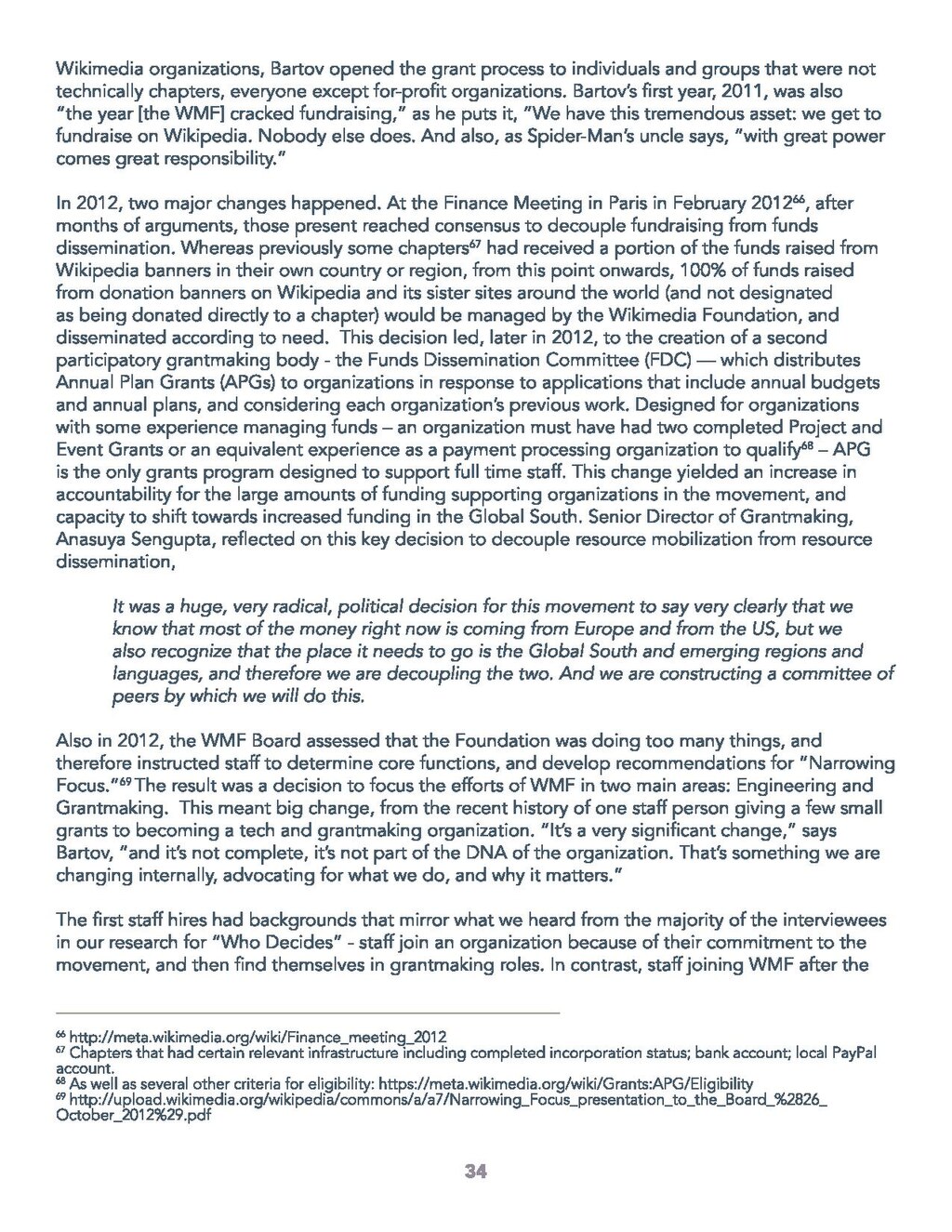Wikimedia organizations, Bartov opened the grant process to individuals and groups that were not technically chapters, everyone except for-profit organizations. Bartov's first year, 2011, was also "the year [the WMF] cracked fundraising," as he puts it, "We have this tremendous asset: we get to fundraise on Wikipedia. Nobody else does. And also, as Spider-Man's uncle says, "with great power comes great responsibility."
In 2012, two major changes happened. At the Finance Meeting in Paris in February 2012[1], after months of arguments, those present reached consensus to decouple fundraising from funds dissemination. Whereas previously some chapters[2] had received a portion of the funds raised from Wikipedia banners in their own country or region, from this point onwards, 100% of funds raised from donation banners on Wikipedia and its sister sites around the world (and not designated as being donated directly to a chapter) would be managed by the Wikimedia Foundation, and disseminated according to need. This decision led, later in 2012, to the creation of a second participatory grantmaking body - the Funds Dissemination Committee (FDC) — which distributes Annual Plan Grants (APGs) to organizations in response to applications that include annual budgets and annual plans, and considering each organization's previous work. Designed for organizations with some experience managing funds — an organization must have had two completed Project and Event Grants or an equivalent experience as a payment processing organization to qualify[3] — APG is the only grants program designed to support full time staff. This change yielded an increase in accountability for the large amounts of funding supporting organizations in the movement, and capacity to shift towards increased funding in the Global South. Senior Director of Grantmaking, Anasuya Sengupta, reflected on this key decision to decouple resource mobilization from resource dissemination,
It was a huge, very radical, political decision for this movement to say very clearly that we know that most of the money right now is coming from Europe and from the US, but we also recognize that the place it needs to go is the Global South and emerging regions and languages, and therefore we are decoupling the two. And we are constructing a committee of peers by which we will do this.
Also in 2012, the WMF Board assessed that the Foundation was doing too many things, and therefore instructed staff to determine core functions, and develop recommendations for "Narrowing Focus."[4] The result was a decision to focus the efforts of WMF in two main areas: Engineering and Grantmaking. This meant big change, from the recent history of one staff person giving a few small grants to becoming a tech and grantmaking organization. "It's a very significant change," says Bartov, "and it's not complete, it's not part of the DNA of the organization. That's something we are changing internally, advocating for what we do, and why it matters."
The first staff hires had backgrounds that mirror what we heard from the majority of the interviewees in our research for "Who Decides" - staff join an organization because of their commitment to the movement, and then find themselves in grantmaking roles. In contrast, staff joining WMF after the
- ↑ http://meta.wikimedia.org/wiki/Finance_meeting_2012
- ↑ Chapters that had certain relevant infrastructure including completed incorporation status; bank account; local PayPal account.
- ↑ As well as several other criteria for eligibility: https://meta.wikimedia.org/wiki/Grants:APG/Eligibility
- ↑ http://upload.wikimedia.org/wikipedia/commons/a/a7/Narrowing_Focus_presentation_to_the_Board_%2826_ October_2012%29.pdf
34

